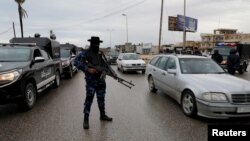The United Nations, Arab League, and European Union are urging both sides fighting for power in Libya to abide by the cease-fire that took effect Sunday.
Russian President Vladimir Putin and Turkish President Recep Tayyip Erdogan, who support different sides, spent the week calling for the truce.
The U.N. mission in Libya is asking both warring sides to "respect the cease-fire" and efforts to hold peace talks.
European embassies in Tripoli sent out a joint statement urging Libyans to "seize this fragile opportunity to address the key political, economic, and security issues" that caused the fighting.
Arab League states are pushing both rivals in Libya to "commit to stop the fighting, work on alleviating all forms of escalations and engage in good faith aimed at reaching permanent arrangements for a cease-fire."
The truce was generally holding Sunday although some minor violations were reported.
Forces from a rival administration in eastern Libya led by General Khalifa Haftar are fighting the U.N. backed government in Tripoli, headed by Prime Minister Fayez al-Sarraj.
Al-Sarraj's government says no truce can success unless Haftar withdraws his forces from the outskirts of Tripoli. Both sides have been battling for control of the capital since April with hundreds of thousands of civilians caught in the middle.
Haftar’s top commandeer tells the Associated Press that "withdrawal is not on the table."
Turkey began deploying soldiers last week to back the government's forces while Russia has reportedly sent mercenaries to support Haftar's fighters.
The U.S. embassy in Tripoli says it is "seriously concerned about toxic foreign interference in the conflict," while some European leaders are worried about Libya turning into a "second Syria."












